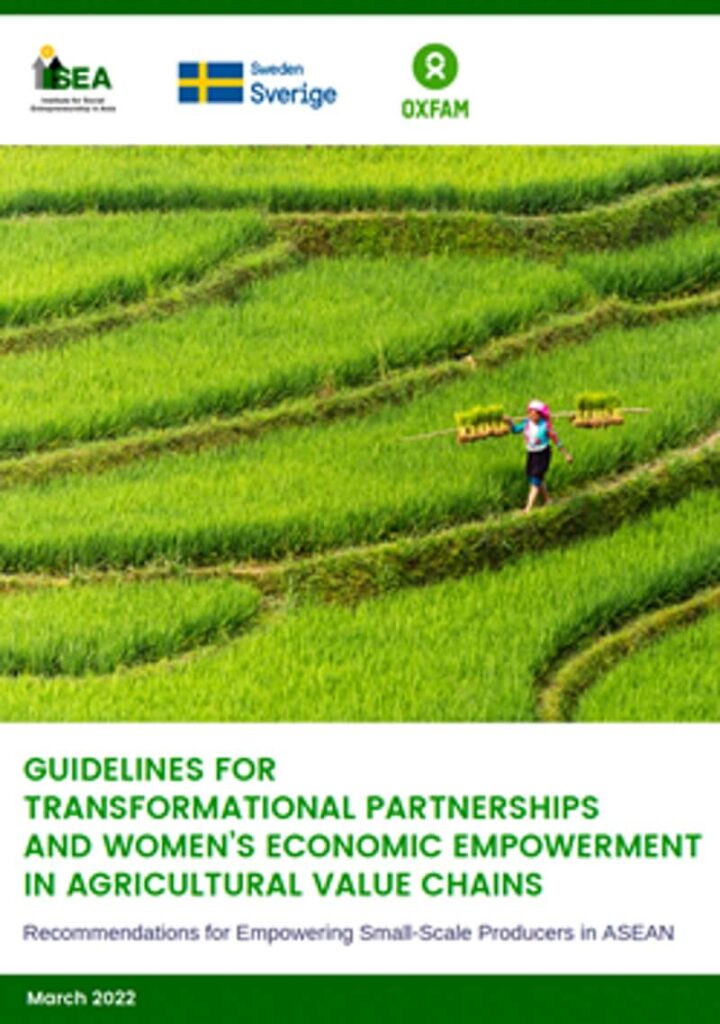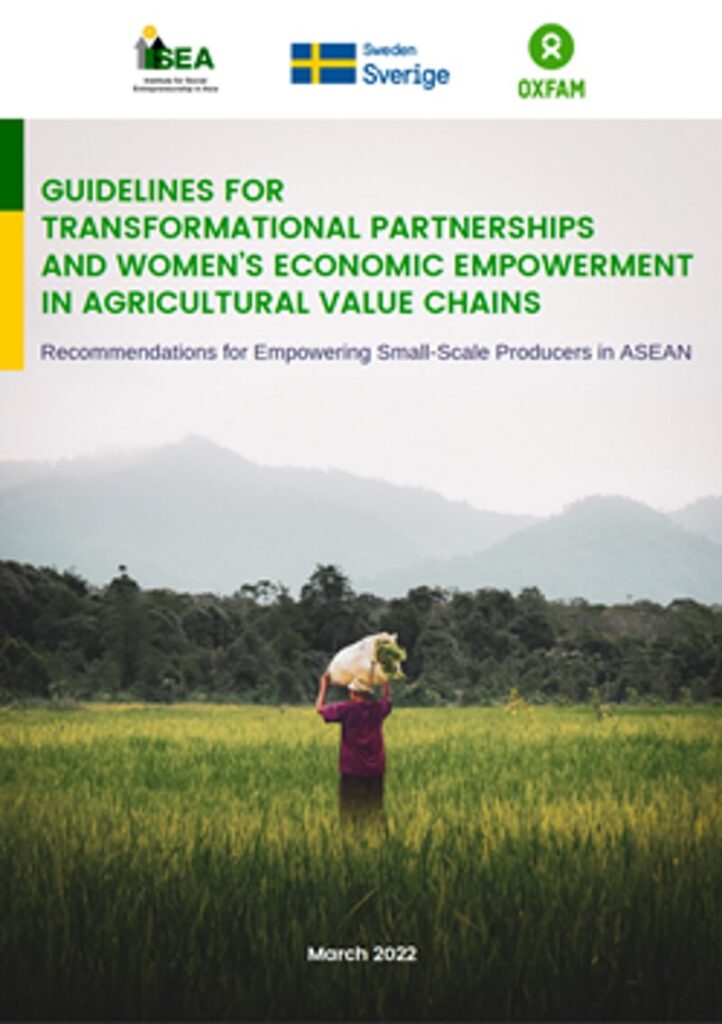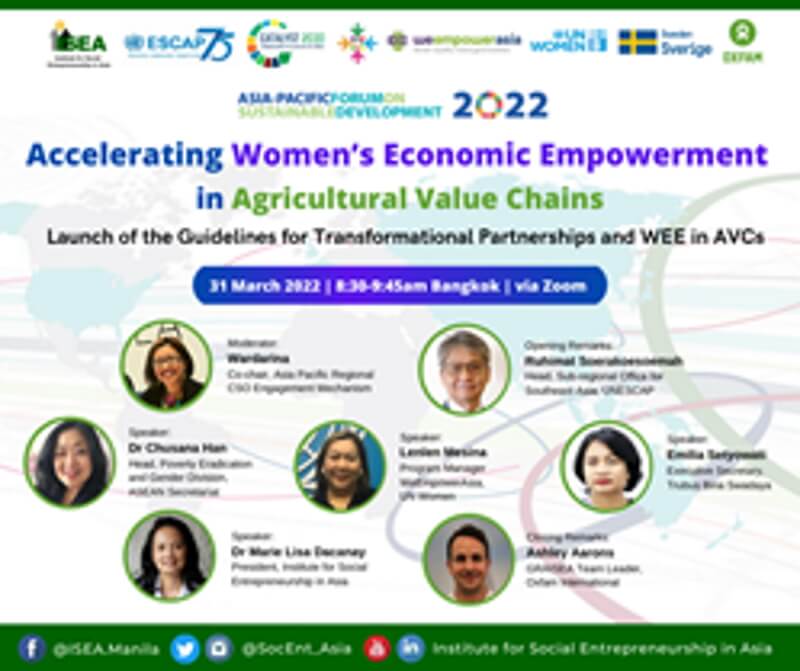GUIDELINES
The Transformational AVC Guidelines are meant to enjoin ASEAN and its member states to provide an enabling environment and ecosystem, including appropriate policies, incentives, and support programs, that would encourage and promote the practice of the Benchmarks.
The overall impact of its successful adoption and implementation could generate transformational partnerships and mainstream women’s economic empowerment in AVCs that, in turn, would significantly contribute to accelerating the achievement of 13 out of the 17 SDGs: Goals 1 (No Poverty), 2 (Zero Hunger), 5 (Gender Equality), 8 (Decent Work), 9 (Industry, Innovation, Infrastructure), 10 (Reducing Inequalities), 11 (Sustainable Cities and Communities), 12 (Responsible Consumption and Production), 13 (Climate Action), 14 (Life Below Water), 15 (Life on Land), 16 (Peace, Justice, and Strong Institutions), and 17 (Partnerships for the Goals).
Enabling innovations that support AVC development for food secure, resilient, and empowered small-scale producer communities
GUIDELINE 1:
Enabling innovations that support AVC development for food secure, resilient, and empowered small-scale producer communities
SUB-GUIDELINES:
- Promote appropriate, affordable, and accessible technology and community-oriented innovations that build on indigenous knowledge systems and are friendly to small-scale producers, especially women
- Enable women and men small-scale producers to reap their fair share of the wealth generated by AVCs
- Ensure food security and nutrition and the resilience of both women and men small-scale producers to health pandemics and natural, social, and economic disasters
- Enable the empowerment of small-scale producers in the agriculture, forestry, and fishery sectors to be the main actors of their own development
Enabling women’s economic empowerment that spans all functions and organizations engaged in AVC development, management, and governance
GUIDELINE 2:
Enabling women’s economic empowerment that spans all functions and organizations engaged in AVC development, management, and governance
SUB-GUIDELINES:
- Invest in transparent and accountable value chain development practices that enhance women’s participation and empowerment as stakeholders in production, consolidation, processing, marketing, and other functions that produce and deliver agricultural, forestry, and fishery products to markets
Invest in transforming women small-scale producers in agriculture, forestry, and fishery, individually and in groups, into entrepreneurs, leaders, and stakeholders of enterprises and organizations promoting women’s economic empowerment
Mobilization of investments on sustainable consumption and production systems that enable women and men small-scale producers as stakeholders in achieving a climate-resilient and green economy
GUIDELINE 3:
Mobilization of investments on sustainable consumption and production systems that enable women and men small-scale producers as stakeholders in achieving a climate-resilient and green economy
SUB-GUIDELINES:
- Invest in and enable sustainable consumption and production systems that will empower women and men small-scale producers to become stewards of the natural resource base that sustains their livelihoods and enterprises
- Support investments and interventions that enable enterprises of small-scale producers to effectively adopt and adapt sustainable consumption and production technologies and practices in value chain functions beyond production
Recognition and support for social enterprises and inclusive businesses as innovators and key enablers of women and men small-scale producers in AVCs
GUIDELINE 4:
Recognition and support for social enterprises and inclusive businesses as innovators and key enablers of women and men small-scale producers in AVCs
SUB-GUIDELINES:
- Recognize and enable social enterprises as key stakeholders in empowering women and men small-scale producers in AVCs
- Enable transformational models of inclusive businesses engaged with women and men small-scale producers by supporting their partnership with social enterprises and NGOs
- Invest in and incentivize AVC interventions that support transactional and transformational services among women and men small-scale producers through inclusive and hybrid financing
Mobilization of support for social innovation platforms that mainstream sustainable agriculture, transformational partnerships, and women’s economic empowerment in AVCs toward measurable social impact and accelerating the achievement of the SDGs
GUIDELINE 5:
Mobilization of support for social innovation platforms that mainstream sustainable agriculture, transformational partnerships, and women’s economic empowerment in AVCs toward measurable social impact and accelerating the achievement of the SDGs
SUB-GUIDELINES:
- Invest in and incentivize programs that support AVC stakeholders to co-create social impact and measure outcomes of transformation at the level of women and men small-scale producers, households, and communities, and value chains and economic subsectors
- Enable cross-sectoral collaboration and multi-stakeholder platforms that promote the practice and mainstreaming of the benchmarks toward accelerating the SDGs



